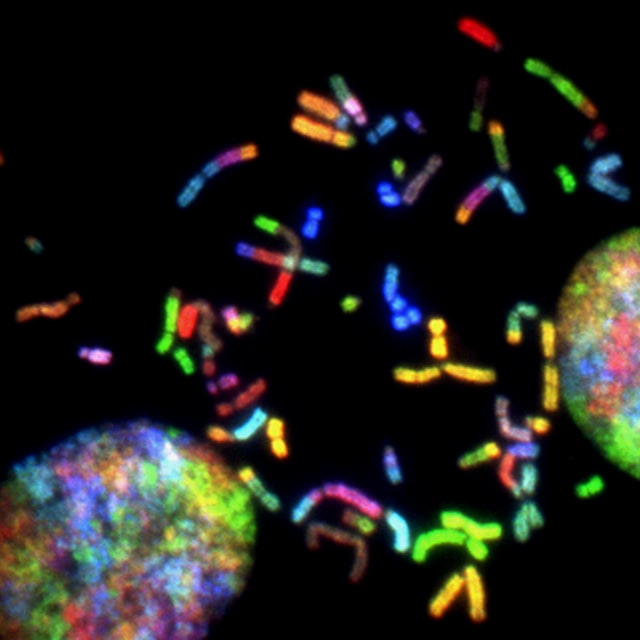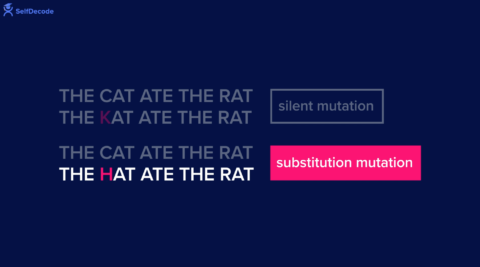
What is a genetic mutation? To put it simply, a mutation is a change in your genetic sequence. There are different types of mutation, and they can have different consequences. What are they?
Are you doomed if you have a genetic mutation? Not necessarily, because everyone has them, a lot of them, actually. They don’t give you superpowers or transform you into Cthulhu-like monsters, but they can be harmful or helpful or irrelevant, depending. Depending on what, you ask? Well, let’s start by looking at how they happen.
How Do Genetic Mutations Happen?
You are conceived as a collection of information from your parents. The Book of Mom and The Book of Dad had their covers removed and the pages were then shuffled together to create The Book of You.
Within these pages are the instructions for building, operating, and maintaining you. This book, this manual for who you are, resides within nearly every cell of your body. It’s your genome, the collection of all your DNA, roughly 6 billion paired up letters repeated over about one million pages, divided into 23 chapters, which make up your chromosome pairs. Without it, your cells wouldn’t know what to do, what to produce.
So, every time a new cell gets made, from the very beginning when you were just a few cells, until now, billions of cells later, that book gets copied. Evolution has turned this into a pretty efficient process, minimizing the errors by having you make editors to help in the process. These editors go around and fix places in your book where a letter or letters got copied wrong.
Now, these copy editors aren’t perfect. They miss an error on occasion. This happens about once in every book copy. That sounds impressive, copying an entire book with only one mistake, but recall that there are several billion copies in your body!
These mistakes, the errors in the code, are what we call a genetic mutation. Now, you add these up, and it’s a big number. This assumes too, that you do nothing in your life to increase the number. Things like getting sunburned or drunk or breathing in the fumes of a passing bus can make it more likely that you get an error.
Genetic mutations can be good, bad, or indifferent, but the fact remains that, regardless of what you do, you will pass some of this random uniqueness on to your children.
Fortunately, the vast majority of these mutations are of the indifferent variety. How can this be, you wonder? How can you have millions of mutations and have so many of them not matter? Well, that’s because out of that million-page book, some pages matter more than others. Only about 10,000 pages actually have your genes written on them.
Now, you likely see the term “variant” tossed around too. Understand that we are basically talking about the same thing. Mutations happen all of the time. It’s normal. It simply means that a change occurred in the DNA. If it becomes common enough in the population as a whole, it becomes a variant. So, it’s merely a difference of numbers, not substance.
Types of Mutations
Remember, a genetic mutation is just a change in the letters. Your genome, that entire strand of DNA, is composed of just 4 letters (representing four nitrogen bases). So, the possible mutations you can have all deal with the various ways things can happen with those four letters.
If you consider the types of errors you can make typing out a manuscript, you can forget letters, repeat letters, switch letters; it can all happen in your DNA.
The informative video below can help clarify what is a genetic mutation, and what are the most common types.
Some common genetic mutation types include:
- Substitutions
- Deletions
- Insertions
- Duplications
- Inversions
Substitutions
Substitutions are like a typo. It’s when one letter gets replaced with another. When substitutions happen within a gene, they can be silent, missense, or nonsense mutations.
You don’t really notice many of these writing errors. These are silent mutations. You read through them without a pause because you see and understand the word and the error has no effect on what you are reading.
For example, imagine that the word “cat” is spelled “kat.” It looks different but it sounds the same, and you can understand what it means. This type of mutation is one that won’t have much impact on your life because the gene is going to code the right protein.
What happens when that “cat” becomes a “rat”? Well, that might work. They’re both animals, right? It still makes sense. We call that a missense mutation. What happens here is that your gene will make a slightly altered protein.
But what if it became a “hat”? Now it is something else entirely. That animate thing just became inanimate. If that was a gene that was supposed to be providing cat code in order to make a mousetrap protein, that trap doesn’t work nearly as well with a hat. This is called a nonsense mutation. The protein becomes shorter, incomplete, and often loses its function.
Insertions and Deletions
There are even more disruptive mutations that add or remove letters from a sentence. These are called insertion and deletion mutations. As you might guess by the description, letters get added or removed. This could be a tiny change, like “cat” becoming “at”.
This kind of genetic mutation is not limited to single letters, however. The “cat” might be removed entirely. When code is read to make a protein, the instructions are never as simple as the word, “cat”. It can be a whole sentence or page or many pages.
As the error scales up in size, the more likely the mutation will have a problematic effect. The same is true for adding things in.
Duplications and Inversions
Then there is the possibility of the copier getting stuck and repeating the same word, phrase, or page over and over. These are called duplications. You might even get pages of code copied in reverse order, which is called an “inversion” mutation.
Mutations Also Happen Outside of Your Genes
So, there is a great deal of variety when it comes to mutations. Drastic things can happen from one mutation, but it’s very rare.
Remember, most mutations happen outside of your genes. But does this mean they have no impact? We know now that these mutations do play important roles. They have the effect of turning genes on/off or deciding which proteins get produced in which quantities and when and where.
However, their effects tend to be small. Thus, one little mutation may do next to nothing, but 47 next-to-nothings become a little bit of something. There can be a cumulative effect.
It’s this cumulative effect that often influences your odds of more common “non-genetic” diseases, such as high blood pressure, diabetes, or heart disease.
Your odds for getting disease “X” might be 2%, but another person’s unique combination puts them at 12%. But that doesn’t mean either of you will develop the disease, nor that you won’t. That’s because there’s more to your story than your genes.
Genetic Mutations Are Not the Whole Story
Here is where our analogy with the book no longer holds. Your DNA, including the mutations you carry, are a blueprint for your life. But there’s more to your story – your choices, lifestyle, environment – they all matter. They can change the way your story unfolds.
You can have a lower genetic risk of a disease “X” and still develop the disease because you made all the wrong choices. Or your genetic risk may be high, but your lifestyle and diet help counteract it, and you don’t actually get the disease.
Testing your DNA can go a long way toward showing you where your odds lie for a vast number of health issues, big and small. Knowing these can allow you to take proactive steps to mitigate the odds, for everything from arthritis to diabetes.
But your genes don’t just influence your likelihood of developing a certain trait or health condition. They can also play a role in how you respond to strategies to lower your overall health risks.
Let’s look at the APOE gene, for example. It codes for apolipoprotein E (apoE), which helps remove fats like triglycerides and cholesterol from the blood. A variant on this gene has been linked to heart disease and high cholesterol.
Fortunately, by knowing which variant you carry, you can make targeted changes to your lifestyle to counteract the negative effects of your genes. In this example, maybe switching to a Mediterranean diet may help you lower your risk for heart issues.
SelfDecode examines up to 83 million genetic variants, letting you know if the mutations you have may raise your risks for certain conditions. More than that, SelfDecode gives you personalized diet, lifestyle, and supplement recommendations aimed at improving overall health.
Genetic mutations may have a bad reputation, but know that knowing your risks can be an advantage when it comes to optimizing your health. If you want to learn how your genes affect your health, and what you can do about it, you should check SelfDecode.
A Genetic Mutation Can Also Be Good
Finally, it’s easy to focus on the bad with mutations. But remember that mutations are important. They allow us to change and adapt to new environments.
Genetic mutations made humans possible in the first place. They helped us have larger brains, develop language, use tools, etc. Can you digest milk as an adult? That’s a result of a beneficial mutation. Have you heard that some people are resistant to the HIV virus? Also a beneficial mutation. The list goes on and on.
If you know which genetic mutations you have, you can make targeted changes to your lifestyle that will work best for you. Check out SelfDecode for personalized diet, lifestyle, and supplement recommendations based on your DNA.
Related Articles
- What Is The Best DNA Test Kit? The Ultimate Guide
- Best DNA Test for Health: 6 Things you Need to Know
- Top 10 Sites To Upload Your Raw DNA Data



